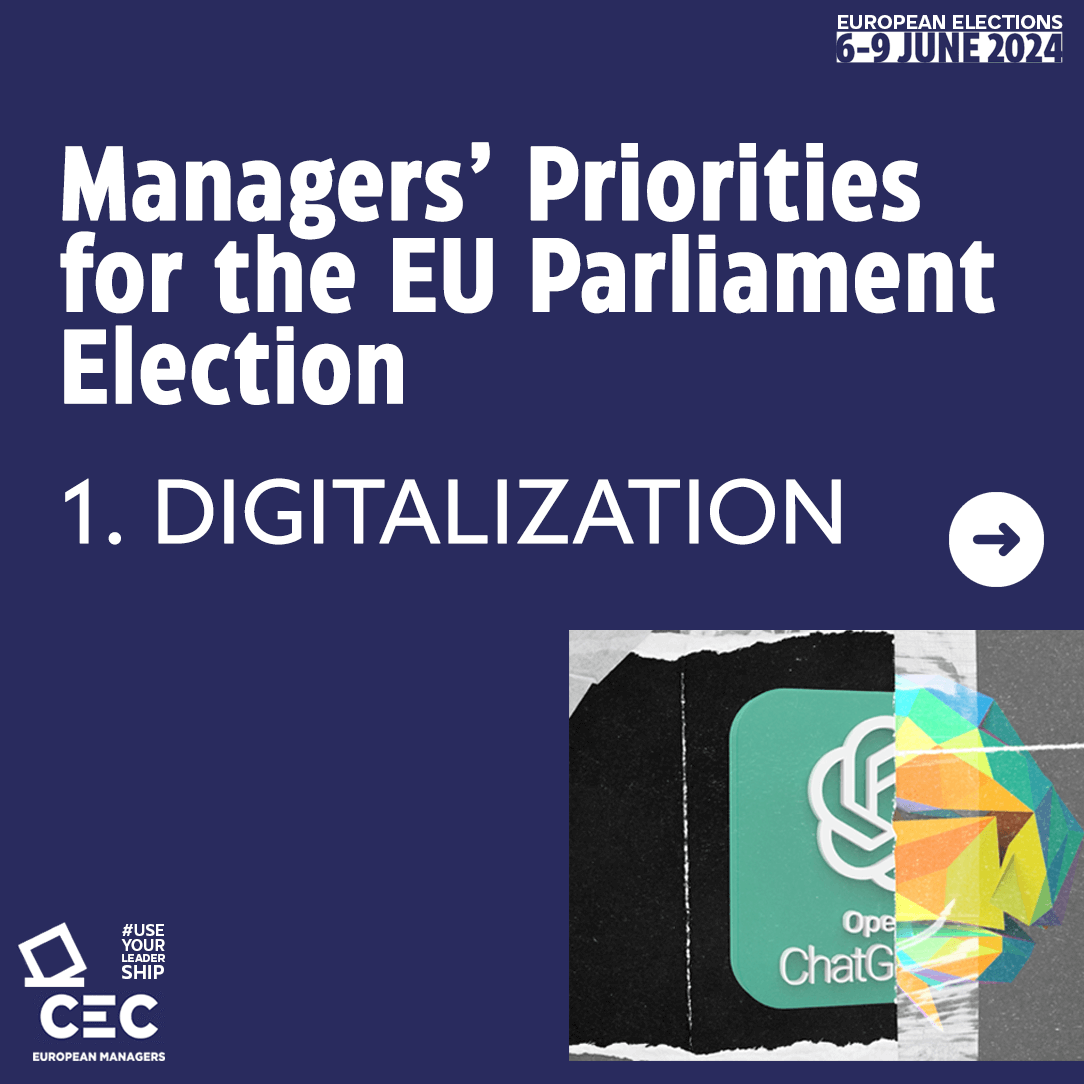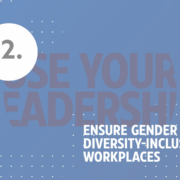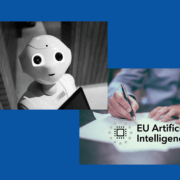1/7 Digitalization – EU Elections
There seems to be a global consensus regarding leadership on Artificial Intelligence, which places managers’ roles and interests high on the agenda. Managers decide how work is organized in a company, and their choices determine whether Artificial Intelligence augments or automates human work.
Generally speaking, AI is already integrated into daily management work. CEC European Managers—representing more than 1 million managers in Europe—agrees that it offers productivity gains and facilitates task reorganization. But some concerns are being raised.
General context – What do managers think?
In general terms, Artificial Intelligence is fostering leadership competencies, transparent governance, and collaborative innovation ecosystems.
In a study led by Harvard University, 1,770 managers from 14 countries and 37 executives in charge of digital transformation at their organizations were surveyed.
Most of the study participants voiced the need to reduce administrative and bureaucratic tasks. According to this study, 54% of managers’ and executives’ available time was spent on administration duties. In this sense, Artificial Intelligence was seen by the majority as a helpful ally.
However, almost a third of the surveyed managers expressed concern about AI appropriating fully human skills, such as creative thinking. To prevent automation processes and computers from taking over, managers call on politicians and administrations to implement training programs and disseminate creativity and abstract thinking as valuable resources.
The Harvard study concludes that AI will ultimately prove cheaper, more efficient, and potentially more impartial in its actions than human beings. It states that such a scenario should not cause concern for managers, as it just means that their jobs will change to focus on things only humans can do.
The Max Planck Institute for Innovation and Competition Research recently published another interesting paper. Monopsony and Automation is a US-centred research led by José Azar, Marina Chugunova, Klaus Keller and Sampsa Samila.
They have concluded that US commuting zones that are more exposed to industrial robots exhibit considerably larger reductions in both employment and wages when their labor markets demonstrate higher levels of concentration.
In that sense, lead author Sampsa Samila explained in a Forbes article (AI And The Future Of Jobs: A Management Challenge) that “it’s important to keep in mind that any decision to augment or automate work is not necessarily an inherent feature of the technology, but a choice made by managers.”
Any decision to augment or automate work is not necessarily an inherent feature of the technology but a choice made by managers.
Sampsa Samila
Professor of Strategic Management, IESE Business School
Artificial Intelligence in Europe
The Artificial Intelligence debate will undoubtedly consistently impact public discussions in the run-up to the European elections.
The recent approval of the first European—and worldwide—AI Act that regulates Artificial Intelligence and promotes its responsible progress provides the European Union with the first legal and helpful framework.
After years of various contributions by numerous stakeholders and through a process that started long before tools like Chat GPT were even created, the AI Act has entered into force in the EU Member States.
The debate around the right to know how decisions are made is particularly relevant. Since it is often impossible to find out why an AI system has made a decision or prediction and taken a particular action, it is difficult to assess whether someone has been unfairly disadvantaged, such as in a hiring decision or an application for a public benefit scheme.
That is why CEC European Managers, through its Working Group on Digitalization and Artificial Intelligence, led by the president of the confederation, Maxime Legrand, took the lead and published a specific position paper, aiming to be used by policymakers and EU institutions as a guideline.
It is often impossible to find out why an AI system has made a decision or prediction and taken a particular action

Download our Position paper on AI Leadership here
Use Your Leadership – 1/7 Digitalization
CEC European Managers has launched the campaign #UseYourLeadership, as an endorsement to the campaign led by the European Parliament: Use Your Vote.
With this campaign, here are 7 key priorities that the politicians elected in the next parliamentary term should prioritize, the first being Digitalization.
We are convinced that regulations and agreements around the workplace’s digital transformation must promote essential aspects such as the “right to a human manager” to handle AI-system-related requests.
Responsible leaders and developers behind AI systems should be visible, liable, and accessible. Clear legal frameworks and responsibilities are crucial, especially in high-risk areas.
CEC European Managers strongly advocates for the European Union to champion a culture of lifelong learning by investing in programs that enhance leadership competencies and promote diversity in AI development teams. We also encourage political initiatives that address unconscious bias and ensure data diversity.
CEC European Managers strongly advocates for the European Union to champion a culture of lifelong learning by investing in programs that enhance leadership competencies and promote diversity in AI development teams
As we approach the upcoming European elections, we seek your collaboration to support responsible Artificial Intelligence (AI) development, fostering leadership competencies, transparent governance, and collaborative innovation ecosystems. Join the #UseYourLeadership campaign, and lead with your vote.
In the absence of social partnership structures, public policies should promote social dialogue on AI, emphasizing shared knowledge and negotiated agreements with trade unions and/or workers’/manager representatives.
You can download and post our Digitalization carousel for LinkedIn here +
Don’t forget to share the hashtag #UseYourLeadership.











